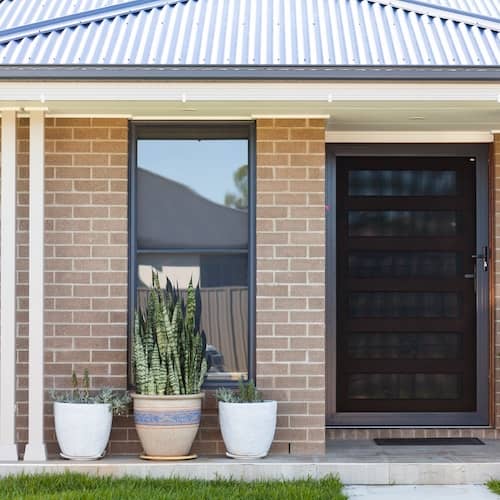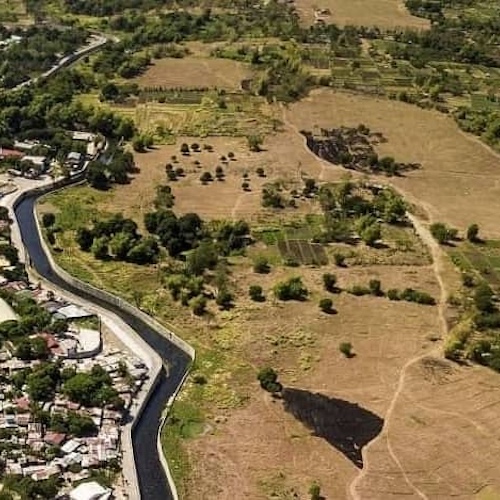A guide to buying landlocked property
Contributed by Sarah Henseler
Sep 8, 2025
•7-minute read
Some properties don’t have direct access to a public road. With a landlocked property, you have to cross over one or more neighboring properties to reach the street. Purchasing a landlocked property means you’ll either need to negotiate with your neighbors for the right to cross their property or take legal means to gain access to a road. Let’s take a closer look at what a landlocked property is and how it works when you own one.
What does landlocked property mean in real estate?
A landlocked property is a piece of land without legal access to a public road. Because it’s surrounded by lots owned by others, the only way to reach the land is by crossing a neighbor’s property.
A typical example of landlocked property would be land in a wooded, rural area that is surrounded by lots with different owners. Because there’s no road providing access, it’s considered landlocked. Another example could be a vacant lot behind a shopping mall. If the only way to get to this lot is by walking through the mall's property, it’s landlocked.
Plots of land don’t have to remain landlocked. A buyer can negotiate with the owner of a neighboring land or property for an easement or right of way. The agreement may grant the buyer a strip of land they can use on the neighbor’s property to build an access road or travel across the property to reach their land.
Subdividing parcels of land
Parcels of land typically become landlocked after owners have chosen to subdivide their properties. For example, a landowner who has a large parcel of land in a largely undeveloped area may decide to divide it up to sell separately. Landowners can negotiate easements for parcels that lack an access road to a main road. The easements allow buyers to build private roads from a main road.
In order to subdivide a parcel of land, you’ll need to first determine the property lines. Property lines are established by a surveyor and are the borders that mark where a plot of land starts and ends. The property line in the front of the property is called frontage and the side property lines are called sidelines. When land is subdivided, new property lines are established.
Google Maps and apps like LandGrid can show you the property lines for many different properties. The most precise way to establish property lines is by reviewing your property deed and hiring a licensed land surveyor.
What is an easement?
If you purchase a landlocked property, you’ll likely need to secure an easement from a neighboring property owner that gives you access from the property to the public road. This can be as straightforward as a neighbor formally granting you the right to drive through their driveway. Another option is for your neighbor to grant you the right to create a driveway or access road that runs through their property and leads to your land.
You can negotiate directly with your neighbor to get an easement and decide on what kind of fee you’ll pay them for it. It’s important for this to be done formally using legal documents instead of relying on a verbal agreement. Even if you have a friendly relationship with your neighbor, if they change their mind, you won’t be able to access your property.
If your neighbor doesn’t want to grant an easement, you may have to file a lawsuit and convince a court to grant you an easement.
When do you need an easement?
Let’s say you found the most picturesque lakeside property that would make the perfect vacation home. The only trouble is that the main road doesn’t extend to that property, and you need to cross your neighbor’s land to get to and from your new vacation home. An easement gives you the legal right to do that as you please.
It’s also possible that someone might need an easement on your property. If you’ve subdivided the land you own and you’ve sold a portion that doesn’t connect directly to the street, the buyer may need an easement from you.
What is a right of way easement?
A right of way easement allows you to travel over another person’s property to access the main road. Maybe you need to travel down a paved driveway over your neighbor’s land to get from a public road to your property. If your neighbor gives you access to that driveway, that’s a right of way easement. An important distinction is that the only right you have is to use the road for travel. You can’t build a road on the land.
An easement gives you the right to use another person’s property for various designated purposes. If you need to build a driveway that connects your property to a main road but can’t do that without crossing over your neighbor’s land, you’ll need an easement to build a driveway legally.
Easement by necessity
If a neighboring property owner won’t grant an easement, then you can get an easement by necessity. This version of an easement is a court order that grants you access to a neighboring property.
To get an easement by necessity, take a look at your deed and order a title search to prove that your landlocked property and the neighboring property were once owned by the same person. If that’s the case, the court will typically find that the previous owner failed to provide road access when dividing the land and grant the easement of necessity to ensure your landlocked plot of land remains useful.
How to get an easement for a landlocked property
There are several different ways to obtain an easement to access landlocked property. Let’s take a look at your options.
Hire an attorney
To make sure your easement is fair and legally binding, it’s advisable to work with a real estate attorney to draft a written agreement. A real estate attorney can help you work with your neighbor to negotiate a fair deal. Remember, an easement agreement must be a written agreement. This way, you can refer to the documents if there is a future dispute over your access to the property.
Survey the land
Next, you’ll want to hire a professional to survey your land. The surveyor will draw up maps showing the exact boundaries of your property and research the recorded history of your land and its neighboring lots. This land survey will reveal whether your property is the result of a larger property that has been subdivided.
The survey may uncover previous access routes to your land, which can make it easier to get an easement. If you need to go to court, the information in the survey could bolster your case.
Contact the property owner
The most direct way to secure an easement is to meet with the property owner. You may have to pay your neighbor a fee, but it’ll be less expensive and time-consuming than going to court.
Make an offer and negotiate
Working out a deal with a neighboring property owner will likely take some negotiation. A property owner may reject your original offer for the easement and make a counteroffer. If you don’t agree with the counteroffer or the fee your neighbor wants, you’ll have to continue negotiating.
File a court order
If you and your neighbor can’t agree, your real estate attorney will likely need to sue for access to your property. Filing a lawsuit for an easement is expensive, takes time, and can be stressful. While you may succeed in court, it may strain your relationship with the property owner. Going to court for an easement should be considered a last resort.
Pros and cons of buying landlocked property
Depending on your goals, buying landlocked property can have advantages and disadvantages. It’s often cheaper, but there will be obstacles to accessing the property.
Pros
Buying a landlocked property has its advantages, such as:
- Landlocked properties are often cheaper because there’s no direct road access.
- Buying a landlocked property can offer an opportunity to buy real estate in a neighborhood or rural area that would otherwise be out of reach.
- Landlocked properties can be quieter without any street noise.
Cons
Landlocked properties do come with downsides, so be sure to consider the following:
- You’ll need to negotiate how you’ll access the property.
- In many cases, you’ll need to pay for an easement.
- If you and your neighbor can’t reach a deal, you’ll face a legal dispute.
- Lenders may hesitate to finance a landlocked property because it’s less accessible to emergency and medical services.
FAQ
Let’s take a look at the answers to some frequently asked questions about landlocked properties.
Is landlocked property bad?
Buying a landlocked property will require the additional step of negotiating how you’ll be able to access it. As long as you factor in that potential additional cost, buying a landlocked property can be a great move if the property is right for you.
Who owns the access road?
If your property is landlocked, then you may have to get an easement to use an access road that is owned by your neighbor.
Do banks finance landlocked property?
Landlocked properties can be more difficult to secure financing for if you do not own an adjacent, non-landlocked property.
The bottom line: Understand landlocked property law before purchasing
Buying landlocked property comes with pros and cons. You may be able to get a steep discount on the purchase price, but you’ll need to negotiate and likely pay to gain permanent access from the main road. This may require lengthy negotiations or even a legal battle if your neighbor isn’t willing to grant you an easement. You’ll have to determine whether the lower price associated with landlocked properties is worth this potential hassle. Visit the Rocket Mortgage® Learning Center for more information and tips on different property types.

Rory Arnold
Rory Arnold is a Los Angeles-based writer who has contributed to a variety of publications, including Quicken Loans, LowerMyBills, Ranker, Earth.com and JerseyDigs. He has also been quoted in The Atlantic. Rory received his Bachelor of Science in Media, Culture and Communication from New York University.
Related resources

11-minute read
Land contracts: What they are and how they work
Land contracts are a form of seller financing where the seller holds the title while the buyer makes payments. Learn how they work and whether they're right for...
Read more
12-minute read
How to get a loan to purchase land
Land loans are used to finance the purchase of a plot of land. However, securing this financing is different from other loans. Here’s what you should know...
Read more

9-minute read
Buying undeveloped land: Pros, cons, and financing tips
Scouting the perfect spot for your dream home? Learn about purchasing undeveloped land, including financing, development costs, and key considerations.
Read more